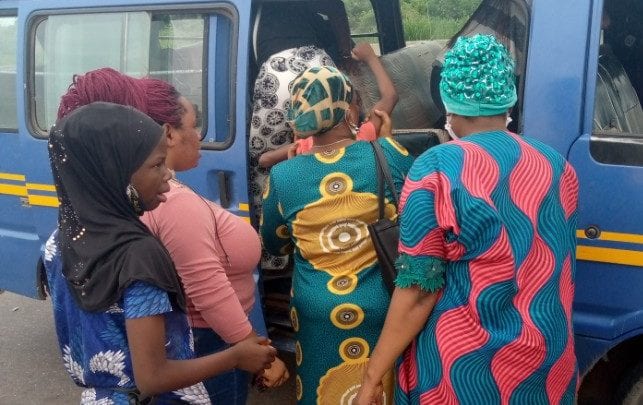
Welcome to Iwo road – the most popular meeting point in Oyo State capital, Ibadan citizens move around for their daily activities like water molecules flowing smoothly past one another, friends staying together with handshakes and hugs.
At the left side of this reporter are men and women peddling goods such as vegetables, sachet water, groundnut, soft drinks, slippers, kerosene, bread and other consumables. At the right direction are folks chattering – struggling to compete with the sounds of horns honking.
Since February 28, Nigeria has been battling with Coronavirus menace. As the pandemic became tougher, the Federal Government opposed gathering of large crowds to avoid the spread of the deadly disease.
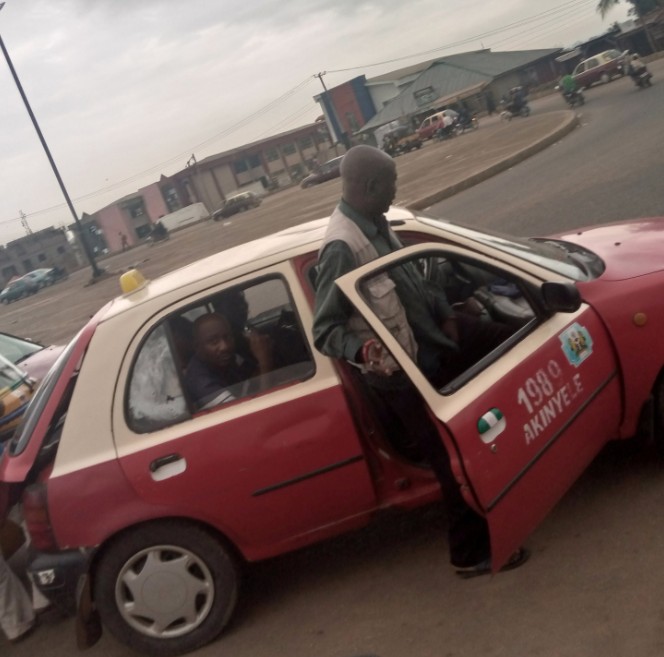
Aside from shutting its international airports, the government also ordered the immediate closure of all the country’s borders to human traffic from March 23. The announcement was made when the country had only recorded 36 cases, with one patient reported dead of Coronavirus.
President Muhammadu Buhari later ordered the total lockdown of Lagos, Abuja and Ogun states on March 30. This was when the country had recorded only 140 active confirmed cases and two deaths. It later placed ban on interstate travels.
Despite all these measures, a POLITICS NIGERIA investigation reveals that the negligence of the Oyo state government to prevalent poverty and ignorance in the state are exposing citizens to Coronavirus risks.
While many other governors lockdown their states to curb the spread of the deadly COVID-19 virus, Mr Makinde refused to do the same on the premise that locking down will cause hardship to residents. Amidst all these, Oyo State recorded the influx of people from different parts of Nigeria including Lagos, the epicentre of the pandemic. Rather than lockdown, he ordered dusk to dawn curfew.
The negative effects of this led to the high number of Coronavirus cases being recorded at iSON Xperiences; an Ibadan company which at the time of this investigation is responsible for 166 of 252.
The governor later accused the call centre that services MTN and Airtel of messing up the image of the state.
In addition to his negligence, controversy trailed the invitation of some Islamic clerics for Iftar (fast-breaking) at the Government House, Ibadan, during Ramadan by Mr Makinde, despite the ban on social gatherings by the Federal Government.
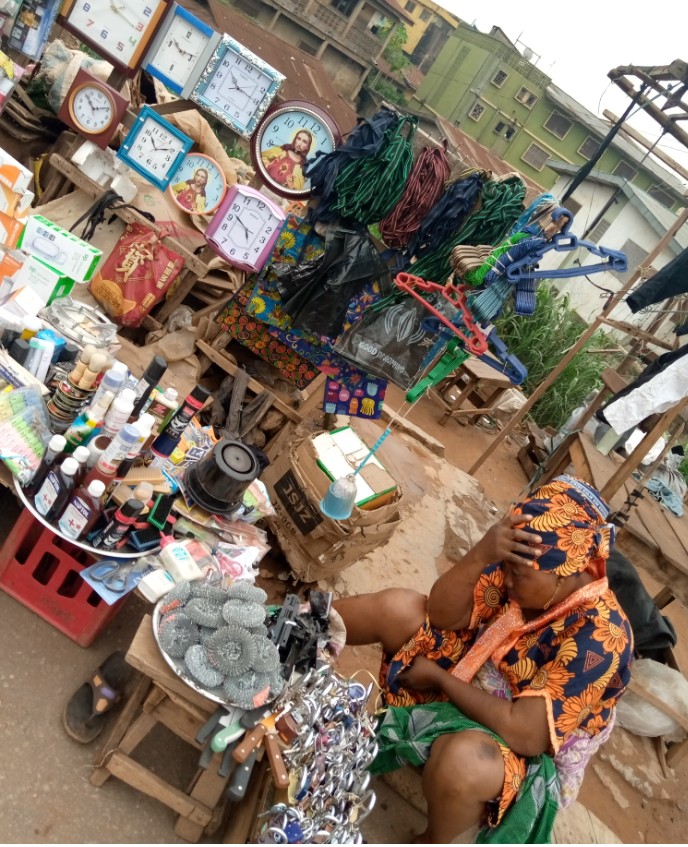
“The governor did not lead by example”, a resident tells POLITICS NIGERIA. “You will recall that despite warnings against gatherings, he held a rally in the state and even mocked the Federal Government at PDP Southwest congress. We can see the mess we find ourselves today”, Bashiru Atanda says.
No respect for social distance
From Iwo road to Iyana Agbala – Kajola to Olodo – Ojo to Moniya, Ibadan offers this reporter a different sense of metropolitan lifestyle amidst the current pandemic. Our correspondent drives from one street to another to observe how well residents observe social distancing.
There are motorcyclists transporting as many as three persons from one location to another all in the name of “Corona only affects the rich”. To have a first-hand experience of the risk folks exposed themselves to, this reporter joined a Micra car popularly refer to as Taxi from Iwo Road to Ojo.
“Ojoo! Ojoo!! Ojoo!!”, the taxi driver in his early 40 joins other colleagues to look for passengers. Already in the car are three elderly women. One is just coming from Ife in Osun State and the other two are going to their shops for business of the day when our correspondent arrives at the terminal.
“Baba, Oya, let’s go since the passengers are complete already”, this reporter tells the driver. “We are waiting for one more person”, the driver replies. When our correspondent enquires if there’s any vacant space available, the driver points at the front seat already occupied by this reporter as they both communicate in Yoruba.
After a while, Lola, a lady in her late 30s joins this reporter in the front seat. “Adjust very well”, she tells POLITICS NIGERIA. Our correspondent is not comfortable with the risk many the residents here expose themselves to. Hence, he speaks to others in the car with him.
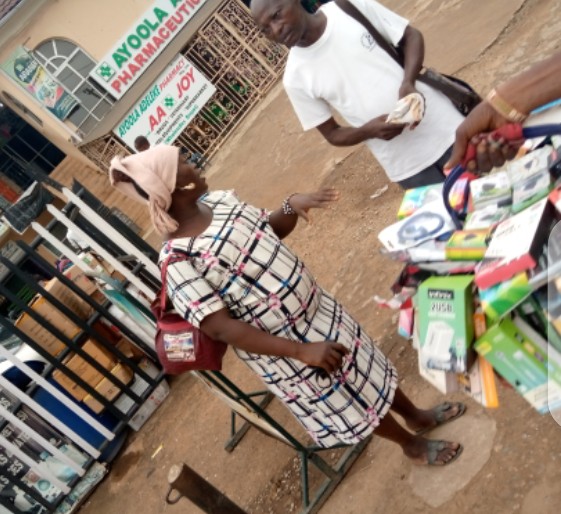
Having held a special place in his heart for freedom of expression, POLITICS NIGERIA reporter explains the danger of not keeping social distance to drivers and other passengers in the vehicle. Rather than give a nod, they oppose – citing hunger as an excuse for writing open letters to the deadly virus.
“The governor is doing well for not making this thing so effective in Ibadan. If he had done like Lagos, hunger would have killed us. The problem I have with educated people like you is that you don’t have the interest of the people at heart”, Lola lashes our correspondent with all sorts of abuse all in the name of questioning why vehicles still carry overload during the pandemic.
As this reporter looks back to get the reaction of other commuters, the enthusiasm to condemn our correspondent has reached its boiling point – they can no longer tolerate his questions on why they fail to take Coronavirus seriously despite evidence of death and confirmed cases even within Oyo State.
Indeed, the scenario in the vehicle from Iwo road to Ojo and later to Moniya speaks volumes of how many residents in the state defy World Health Organisation (WHO) directives on avoiding the virus.
Forbidden face masks in Ibadan
Having passed a night in the city after observing refusal of citizens to obey social distance rule, this reporter’s assignment for the following day is to document major reasons why thousands of persons leave their respective houses without nose/face masks.
Face masks are one tool utilized for preventing the spread of disease. They are loose-fitting masks that cover the nose and mouth and have ear loops or ties or bands at the back of the head.
WHO and other health agencies recommended all citizens wear these masks at places where the 6-foot social distancing rules may be difficult to maintain. Since there are people infected with Covid-19 but do not have symptoms yet, face masks mainly help others from contracting the virus when already infected individuals cough.
Although following the scarcity and hike of surgical masks which was popular before now, experts advise the use of simple clothes face coverings to slow the spread of the virus. These clothes face coverings fashioned from household items or made at home from common materials at low cost can be used as an additional, voluntary public health measure.
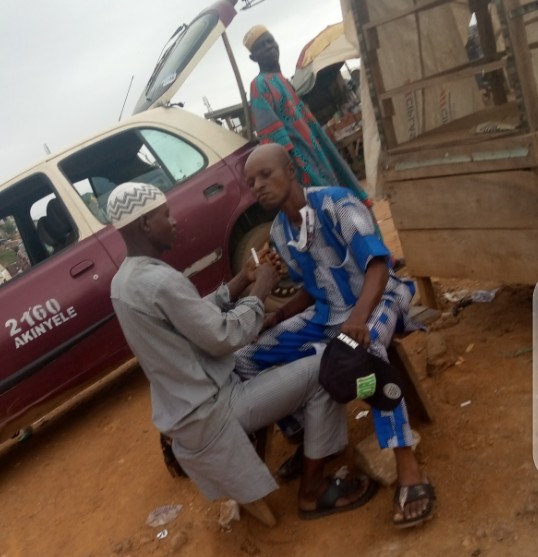
POLITICS NIGERIA findings reveal that these masks are sold for just N50. Yet, residents in popular Ibadan communities ignorantly tell our correspondent that use of these masks will cause them more harm.
Behold, experts only negate masks for young children under age two, anyone who has trouble breathing, or is unconscious, incapacitated, or otherwise unable to remove the mask without assistance. When our reporter steps out very early the next day he arrives in Ibadan to observe face mask adherence, he sees a noisy, stressful, tireless, fast-paced environment. Without masks, people stop motorcyclists and as usual, climb in twos and threes with close marking on the bike.
POLITICS NIGERIA soon comes in contact with some residents. They argue that face masks have their own difficulties. One of those that speaks with our correspondent is a motorcyclist in Elekuru who simply identified himself as Kamoldeen.
He says: “We keep hearing Coronavirus everywhere but I have not seen anybody in my community having the virus. We are not used to face masks in Nigeria. It is more like forcing the unimaginable on us.”
Mr Kamoldeen is not the only person battling with Coronavirus ignorance.
Another resident in Olodo, Iya Rachel sells petty building materials. She tells POLITICS NIGERIA that: “I find it difficult to use the mask. It chokes. So, why must we kill ourselves before the original death”, she says in response to our correspondent enquiries.
“God is the Alpha and Omega. It is a sign for us to know that He is powerful and I see no reason why He won’t protect some of us.” This newspaper’s investigation further reveals that some persons do not use face masks because they believe it is just a decision of some scientists to scare people.
“This face masks of a thing is a matter of free will here in Oyo State and we are happy that our governor is unlike others. I think what is expected of every responsible citizen is to make sure that they try to be hygienic. What is the essence of face masks when you still hug and touch your friends. For me, I don’t believe wearing a mask works, I don’t believe in that theory,” she said.
Poverty
While efforts to combat Coronavirus pandemic remain top gear, poverty affecting Nigeria – the world poverty capital country is also affecting the health sector – most especially in impoverished areas.
Memunat Ajao, who lives in Iyana Agbala appears like someone who has recently lost weight. The weathered lines on her craggy face seemed to be mirrored in the creases of her shabby grey clothes. She hawks bread for living and her appearance defines poverty.
“If I don’t hawk – I won’t have money to feed myself and my little kids. I would have loved to stay indoor if there’s money or a supportive government”, she narrates. Beyond money for survival, POLITICS NIGERIA understands that many communities lack basic amenities such as adequate water supply.
In some instances, residents of one community move to another to form a queue in order to get water, a cluster that defeats the social distance measures put in place by the government, this newspaper gathers.
“Sometimes, people fight to get water. Sometimes, people meet in markets and other crowded places trying to make end means… a poor person cannot obey law and order”, Tosin Ajayi tells POLITICS NIGERIA when questioned about the reason why she disobeys laws and orders.
When contacted about our investigation, an expert, Babatope Fashola, says authorities need to sensitize the residents on how to take necessary measures against the deadly virus.
“From your investigation, you exposed how government negligence is causing harm. This means the state government must continue to sensitize the residents on how best to curb the spread of Coronavirus”.
“It is sad to note that the failure of people to be well informed is causing an increase in the number of cases recorded in Osun. If Governor Makinde had ordered lockdown like every other states, Oyo won’t find itself in the embarrassing situation that iSon Xperiences brought to the state.”
Defensive governor
POLITICS NIGERIA calls the governor, Mr Makinde through his Chief Press Secretary, Taiwo Adisa on our findings. In his response, he defends the activities of the government and the way the state is addressing Coronavirus.
“Oyo Govt cannot take responsibility for breach in interstate movement restriction. You will need to ask yourself where they follow to find themselves in the Oyo. Didn’t they pass other states’ borders? But, I can tell you that we’ve been arresting. We turn people back every day”
On disobedience of orders by residents, Mr Adisa notes that: “if you are doing an investigation, you will always see loopholes but I can tell you that it is not the case in all parts of Oyo State. The state task force is doing its best to make sure people obey orders.”
“There are punishments for anyone that contravenes the laid down procedure for Coronavirus. The enforcement arm of the state are doing their work diligently”, he says despite evidence of breaches. “The state has said those caught not wearing mask could be fined as much as N20,000”.
“Also, the rules brought by Covid-19 are difficult for our people to obey. We are used to freedom… mixing together and all. To make them obey, we will need to keep telling them,” he said.

Gombe gombe
Akko